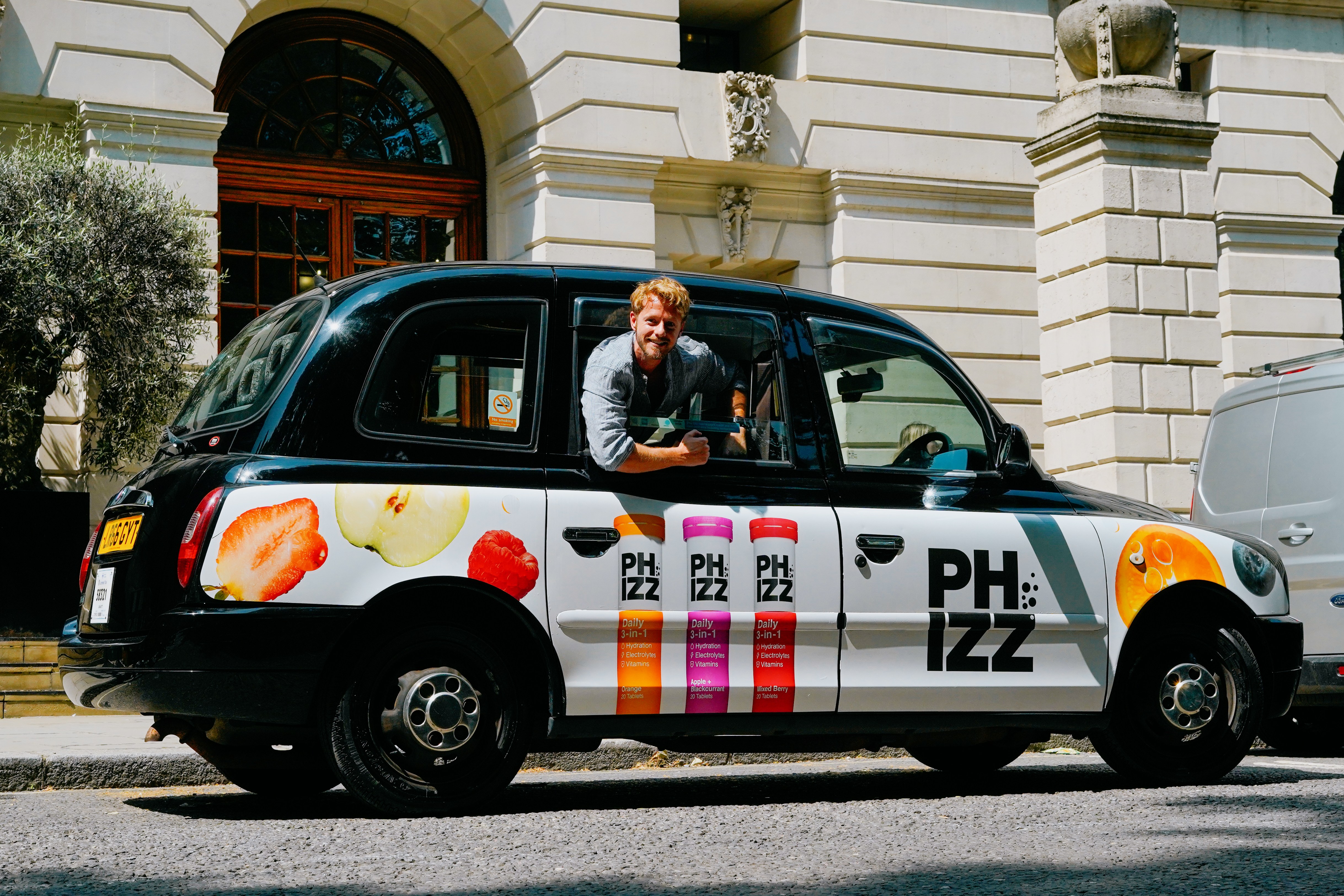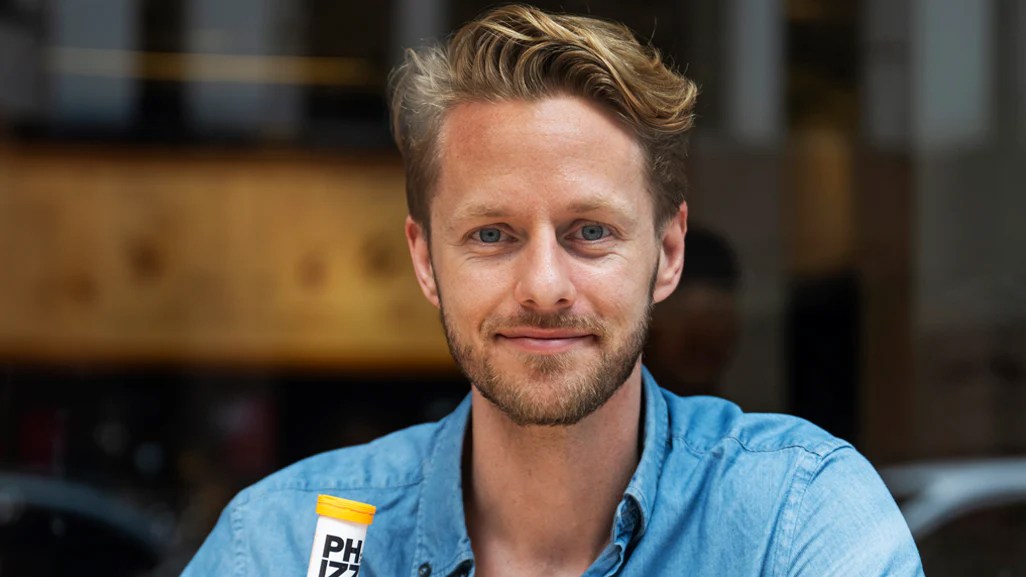Living in London is a rite of passage for many young Australians, but few manage to start businesses with a £9 million-plus turnover from their flatshare.
Daniel Cray, Jonathan Knight and Rory Simmance-Freemantle, friends from their schooldays, came up with the idea for their company after becoming dehydrated on a flight from Melbourne to the UK in 2014. The result was Phizz, a fizzy electrolyte and vitamin tablet that claims to hydrate users three times faster than water alone.
Just over a decade later, Phizz is profitable and expecting £9.5 million in revenues, up from £5.7 million in 2024. Last year, the company made £634,000 in pre-tax profits and now employs 17 people. Its recyclable tablet bottles are stocked by every big UK supermarket, served to first-class passengers on Emirates planes, used at events such as cricket’s T20 World Cup and supplied to Premier League clubs, including Manchester United.
• Gone are days of ten pints on arrival — how Lions are battling jet lag
Cray, whose grandparents moved from Bolton to Melbourne in the 1960s, said of the company’s origins: “We learnt that you can lose litres of water [during a long-haul flight], and that’s a major contributor to your jet lag. That sparked a bit of a deep dive … We learnt how hydration and electrolytes underpin a lot of things — not just muscle performance, but your energy, your focus, your immune defence. [These are all] things that are beneficial to everyone, not just professional athletes.”
The trio, all dual UK-Australia citizens, contacted another friend, Paul Anastasiades,
a British neuroscientist who was doing a fellowship at New York University. “He had a lot of experience utilising electrolyte solutions, because electrolytes and hydration play a huge role in mental performance,” said Cray, now 36. “He validated the opportunity and the science, and went very quickly from a sounding board to an integral co-founder.”

Daniel Cray, left, brought in neuroscientist Paul Anastasiades to develop Phizz’s electrolyte solutions
PHIZZ
Anastasiades, 41, developed Phizz’s “all-in-one” formula, which increases water absorption while delivering a multivitamin — a combination that became the company’s early USP, Cray said. “At the time, nobody had done that before.”
The friends realised they were onto something. They debated whether to set up a company in Australia or the UK, deciding on Britain because of its market size and because “London is an exciting melting pot of everything, so it was a motivating place to come”.
In late 2015, Cray and Simmance-Freemantle, 36, quit their marketing jobs at advertising giant Dentsu in Melbourne (Knight, 43, continued to run an events business alongside Phizz), pooled their savings of £50,000 and headed to the capital.
From their kitchen table in that west London flatshare, the team “built a top-line business plan and then set about trying to find an R&D laboratory”. They negotiated for months, eventually managing to convince a lab to forgo an upfront fee in exchange for a percentage of early sales, and started manufacturing.
“We went through a six-month process of selecting labs and convincing them to work with us. This was nine years ago, and the [wellness] space wasn’t quite as popular,” Cray said. “I was getting paid less than when I was at uni working as a barista.”

Word travels fast: Daniel Cray has got the company’s name on to black cabs in London
PHIZZ
Once the tablet was validated in 2016, the friends “just picked up the phone”. Cray credits emailing the president of Emirates directly with helping them get off the ground.
“We had no black book,” he said. “We’d go to people in positions of higher authority, who wouldn’t be the natural decision-makers [for listing our product], because if we could get their buy-in, it would trickle down … We had Uber in London buy some [tablets] for their office HQ before we even had a sample; we just had some 3D renders.”
Soon, Phizz tablets were being gifted to winners of Grammy music awards and could be found in the five-star Hôtel de Crillon in Paris. “At the time, we weren’t selling outside of our own website … we said yes to everything and took on momentum wherever it came.”
But when Covid hit in 2020, revenues were hovering around £250,000. The founders decided they needed to raise capital to scale up.
They had offers and interest from athletes, and were even “invited into the green room of a famous global pop star”, Cray said, but opted to go with a sole investment from the Saudi Arabian Al Blehed family. Phizz raised just over £2 million from the family, who invest in the education, real estate and consumer goods sectors, and came across Phizz on Emirates flights.
The founders retain a majority stake, and Cray said the team “love the fit” with the Al Bleheds. “They believed in us as a team and what we’re trying to achieve, and were happy to let us run things.
“We’re a business that’s done one capital raise, and we’re growing off of profit — we’re not just burning cash.”

“In the last 18 months or so, search volume for the word ‘electrolytes’ in the UK on Google or Amazon has nearly tripled,” said Daniel Cray
PHIZZ
The turning point “in terms of revenue and business explosion” came in 2021, Cray recalled, when the company secured a retail listing through a place on Sainsbury’s Future Brands programme, an in-house incubator scheme for challenger brands.
“Sainsbury’s took a chance on us,” he said. “It was a huge turning point … The mission was to break into retail and become a household name and grow the category.”
The journey has not all been smooth, however. In the middle of the 2020 fundraising, Simmance-Freemantle was diagnosed with bowel cancer.
“It was a dark chapter,” Cray said. “It was a moment of absolute chaos … It is a bit of a marker now; every week there is something unexpected or that could be somewhat crippling — but compared to that period, nothing is difficult.”
Fortunately, Simmance-Freemantle is now in remission. He remains a Phizz board member, but stepped back as chief executive in 2021 to return to Melbourne and focus on recovery. Knight also stepped away from day-to-day operations at this point, while Anastasiades continued as head of product development alongside a neuroscience lecturing role at the University of Bristol. Cray took up the reins as chief executive and pushed the company forward with a five-person team.
The company nearly went off track, he said, when it branched out into gut health supplements in 2021. This has been one of his biggest lessons in growing a business — realising that sometimes it’s the right decision to scrap a product, even a profitable one, if it is distracting from the company’s core purpose.
Cray said: “In late 2021, we got quite into the gut health world and deployed a pre and probiotic capsule, which had nothing to do with hydration. We gained listings and revenue, but in 2023 we decided to delist … For 12 months, we thought we could be a more holistic wellbeing business that could do all types of supplements, but that was more about chasing revenue than ‘who are we’. The decision to rein that in quickly and get back on mission was pivotal.
“In 2024, we trimmed the international business and just got back to basics — and that’s what put us in a category leadership position. Now we’re looking to branch out into new markets and new products, but it’s all from the core of a hydration-led solution.”
Phizz has also benefited from being in the right place at the right time. The global wellness industry has boomed since the company’s launch in 2015, almost doubling in value from $3.72 trillion to $6.3 trillion by 2023, according to market research firm the Global Wellness Institute.
“In the last 18 months or so, search volume for the word ‘electrolytes’ in the UK on Google or Amazon has nearly tripled,” Cray said. “But we’ve also had new entrants coming in; a huge multinational brand [Liquid IV, owned by Unilever] has spent millions on awareness in the space.”
• What are electrolytes, and are they worth the money?
Cray might have made it, but he still flies economy class to Australia; he just brings a Phizz along for the ride. “I live in a one-bedroom flat in Bermondsey [southeast London] and ride a £150 bike,” he said.
“I’m always focused on next year and what’s coming next. Phizz is generating good profit, and I’ve gone from paying myself less than a barista to a fair market rate, which is a great thing to do from your own business.”
Ask me anything
The best advice I was given … Get going in red-brain [emotion/passion], build with blue-brain [calm, collected, rational]. Passion is what gets you going and keeps you going, but when it comes to decision-making, managing people, [blue-brain] makes all the difference.
The motto I live by … Create a life you can’t wait to wake up to. I have it on my phone screen. If you can’t wake up and think you’re excited for the day to start, things need to change. Work’s going to be stressful — this isn’t all roses and happy days — but nearly a decade in and I’m still energised by it.
If I could tell you one thing … Retailers aren’t looking for something to just swap with an existing brand — they’re wanting incrementality. So how do you add? From a pitch perspective, you need to be going in with that lens.
